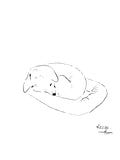Didion and Grief
“Grief turns out to be a place none of us know until we reach it.” Didion reflects poignantly on her own personal grief in The Year of Magical Thinking, leaving behind an honest and moving memoir. In it, the author examines the tumultuous year she has after her husband’s death and daughter’s hospitalisation and how she herself deals with the grief that comes from such severe blows and losses. The language conveys her raw emotions perfectly and she is vulnerable with every spiralling thought that comes up, how she attempts to rationalise her circumstance but still loses in the end to the initial grief she had.
In Discourses, a conversation between the Greek philosopher Epictetus and his pupil Arrian is quoted as follows—
Epictetus: “And if you wish by all your means your children to live or your wife or your brother or your friends, is the matter under your control?”
Arrian: “It is not.”
Stoic philosophy dictates a rational detachment from external things; humans are far from omnipotent and have no control over the course of their life, nor that of their loved ones. Rationally, Didion knows this, but emotionally, it is never easy to surrender to the facts. What we feel is always amplified by memory, by meaning. She talks of her husband’s clothes on the chair the night that he died, the shoes she’s unwilling to throw away because some part of her still expects him to return and be in need of them, the detailed description of their wedding, down to their outfits, the location, the orchards blooming on the side of the road. It is the significance she assigns to them that causes her pain.
Take a pair of shoes. Snow-white Nike Airs with pristine laces. You can see a hundred, a thousand pairs of them in stores, on the market. Yet, one could easily get upset over a pair of them. Let’s say a loved one wore these snow-white Nike airs with pristine laces. The laces grow faded over the years, the left heel breaks in because of the way he scuffs his foot on the ground as he walks. They then become, by interpretation, “his shoes”. If I were to lose this loved one and all that remained were these shoes, they would surely remind me of all his little quirks and make me unbearably sad. But if we were to zoom out, detach, and just look at the material for what it is: a pair of white leather shoes that everybody on the street is wearing, perhaps the pain would be lessened. There is no inherent goodness or badness in our action of assigning significance to things, but it is due to this magnifying of importance that we grieve.
Knowing this, however, is still insufficient to quell the raging battle between head and heart. No matter how rational we are, we will still sit at the door, waiting for a lost one to return. Perhaps to be human is to grieve. To be human is to feel too deeply, to be overly dramatic about the significance of things in our lives. What good would life be if we passed through it unattached, drifters? There is a season for all things, for holding on and letting go–therefore, let time happen.
References
Einzelgänger. (2022, May 13). You don’t lose people. you return them | Stoic Philosophy [Video]. YouTube.
Woronko, M. (2021, December 11). Our deepest desire: humankind’s tendency to assign meaning. Medium. https://medium.com/the-philosophers-stone/our-deepest-desire-humankinds-tendency-to-assign-meaning-f20bb2ae6b6



